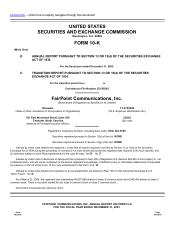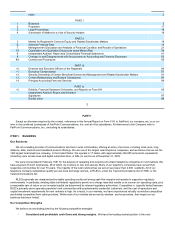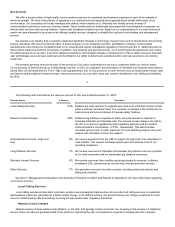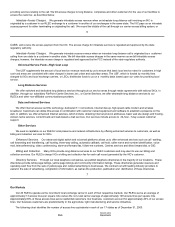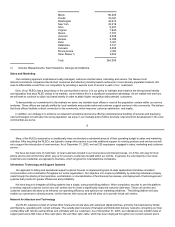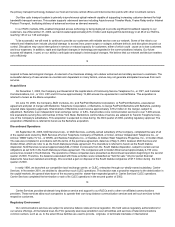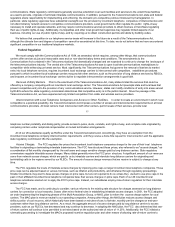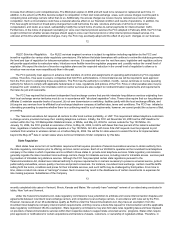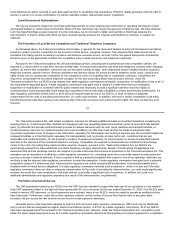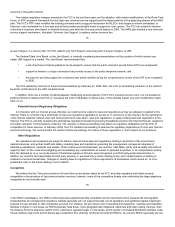FairPoint Communications 2003 Annual Report Download - page 9
Download and view the complete annual report
Please find page 9 of the 2003 FairPoint Communications annual report below. You can navigate through the pages in the report by either clicking on the pages listed below, or by using the keyword search tool below to find specific information within the annual report.
increase their efficiency and competitiveness. The MAG plan expires in 2006 and will need to be renewed or replaced at such time. In
addition, to the extent our RLECs become subject to competition in their own local exchange areas, such access charges could be paid to
competing local exchange carriers rather than to us. Additionally, the access charges we receive may be reduced as a result of wireless
competition. Such a circumstance could have a material adverse effect on our financial condition and results of operations. In addition, the
FCC has sought comment on broad policy changes that could harmonize the rate structure and levels of all forms of intercarrier
compensation, and could, as a result, substantially modify the current forms of carrier-to-carrier payments for interconnected traffic.
Furthermore, in the notice of proposed rulemaking on voice over internet protocol services the FCC adopted in February 2004, the FCC has
sought comment on whether access charges should apply to voice over internet protocol or other internet protocol-based services. It is
unknown at this time what additional changes, if any, the FCC may eventually adopt and the effect of any such changes on our business.
12
Our RLEC services segment revenue is subject to regulation including regulation by the FCC and
incentive regulation by various state regulatory commissions. We believe that state lawmakers will continue to review the statutes governing
the level and type of regulation for telecommunications services. It is expected that over the next few years, legislative and regulatory actions
will provide opportunities to restructure rates, introduce more flexible incentive regulation programs and possibly reduce the overall level of
regulation. We expect the election of incentive regulation plans and the expected reduction in the overall level of regulation to allow us to
introduce new services more expeditiously than in the past.
The FCC generally must approve in advance most transfers of control and assignments of operating authorizations by FCC-regulated
entities. Therefore, if we seek to acquire companies that hold FCC authorizations, in most instances we will be required to seek approval
from the FCC prior to completing those acquisitions. The FCC has the authority to condition, modify, cancel, terminate or revoke operating
authority for failure to comply with applicable federal laws or rules, regulations and policies of the FCC. Fines or other penalties also may be
imposed for such violations. Our interstate common carrier services are also subject to nondiscrimination requirements and requirements
that rates be just and reasonable.
The FCC has required that incumbent independent local exchange carriers that provide interstate long distance services originating from
their local exchange service territories must do so in accordance with "structural separation" rules. These rules require that our long distance
affiliates (i) maintain separate books of account, (ii) not own transmission or switching facilities jointly with the local exchange affiliate, and
(iii) acquire any services from its affiliated local exchange telephone company at tariffed rates, terms and conditions. The FCC has initiated a
rulemaking proceeding to examine whether there is a continuing need for such requirements; however, we cannot predict the outcome of that
proceeding.
The Telecommunications Act required all carriers to offer local number portability, or LNP. This requirement allows telephone customers
to change service providers but keep their existing telephone numbers. Initially, the FCC set November 24, 2003 as the LNP deadline for
carriers within the Top 100 Metropolitan Statistical Areas, or MSAs, and May 24, 2004 for carriers outside the Top 100 MSAs. On
January 16, 2004, the FCC granted an extension of time, to May 24, 2004, to LECs with fewer than two percent of the nation's subscriber
lines, regardless of whether the companies operate in a Top 100 MSA. All LECs with LNP requests must be prepared to port
numbers from wireline to wireless carriers on or before May 24, 2004. We will file for state waivers to extend the time for implementation
beyond the May 24th date in certain states where technical limitations hinder compliance by this date.
Most states have some form of certification requirement that requires providers of telecommunications services to obtain authority from
the state regulatory commission prior to offering common carrier services. Each of our 26 RLECs operates as the incumbent local telephone
company in the states in which it operates and is certified in those states to provide local telephone services. State regulatory commissions
generally regulate the rates incumbent local exchange carriers charge for intrastate services, including rates for intrastate access services paid
by providers of intrastate long distance services. Although the FCC has preempted certain state regulations pursuant to the
Telecommunications Act, states have retained authority to impose requirements on carriers necessary to preserve universal service, protect
public safety and welfare, ensure quality of service and protect consumers. For instance, incumbent local exchange carriers must file tariffs
setting forth the terms, conditions and prices for their intrastate services, and such tariffs may be challenged by third parties. From time to
time, states conduct rate cases or "earnings" reviews. Such reviews may result in the disallowance of certain investments or expenses for
rate making purposes. Subsidiaries of the Company
13
recently completed rate cases in Vermont, Illinois, Kansas and Maine. We currently have "earnings" reviews of our rates being conducted in
Idaho, New York and Vermont.
Under the Telecommunications Act, state regulatory commissions have jurisdiction to arbitrate and review interconnection disputes and
agreements between incumbent local exchange carriers and competitive local exchange carriers, in accordance with rules set by the FCC.
However, because all of our 26 subsidiaries qualify as RLECs under the Telecommunications Act, they have an exemption from the
incumbent local telephone company interconnection requirements until they receive a bona fide request for interconnection and the applicable
state regulatory commission lifts the exemption. State regulatory commissions may also formulate rules regarding taxes and fees imposed
on providers of telecommunications services within their respective states to support state universal service programs. States often require
prior approvals or notifications for certain acquisitions and transfers of assets, customers, or ownership of regulated entities. Therefore, in

